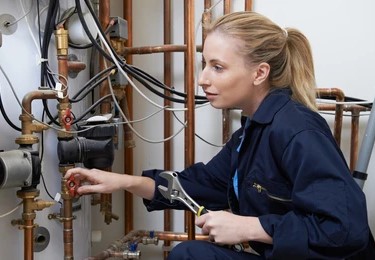
Plumbers may be called on to repair water, drainage, gas, and other piping systems. They also install plumbing fixtures such as bathtubs and toilets, and appliances, such as dishwashers and water heaters. Plumbers maintain septic systems, the large, underground holding tanks that collect waste from houses which are not yet connected to a public utility sewer system
Master plumbers on construction jobs may be involved with developing blueprints that show the placement of all the pipes and fixtures. This helps ensure that a structure's plumbing meets building codes, stays on budget, and works well with the location of other utilities, such as electric wiring. Diagrams are now created digitally with the use of Building Information Modeling (BIM), which allows a building's physical systems to be planned and coordinated across occupations.
Residential water systems, for example, use copper, steel, and plastic pipe that one or two plumbers can install. However, power plant water systems, by contrast, are made of large steel pipes that require a well-trained crew of pipefitters to install correctly. Pipefitters install and maintain pipes that carry chemicals, acids, and gases. These pipes are used mostly in manufacturing, commercial, and industrial settings. Fitters install and repair pipe systems in power plants, as well as heating and cooling systems in large office buildings.
Most plumbers, pipefitters, and steamfitters learn their trade through a 4- or 5-year apprenticeship. Apprentices typically receive 2,000 hours of paid on-the-job training each year. In the classroom, apprentices learn safety, local plumbing codes and regulations, and blueprint reading. Apprenticeship programs are offered by unions and businesses. Although most workers enter apprenticeships directly, some start out as helpers. The Home Builders Institute offers a pre-apprenticeship training program in plumbing.
| Certification Level | Skills Required |
| Apprentice Plumber |
|
| Journeyman Plumber |
|
| Master Plumber |
|
After completing an apprenticeship program, plumbers, pipefitters, and steamfitters are considered to be journey workers, qualifying them to perform duties on their own. Plumbers with several years of plumbing experience may earn master status by passing an exam. Some states require a business to employ a master plumber in order to obtain a plumbing contractor's license.
Most states require plumbers to be licensed. Although licensing requirements vary, most states and localities require workers to have 2 to 5 years of experience and to pass an exam that shows their knowledge of the trade and of local plumbing codes before they are permitted to work independently. Some states require pipefitters to be licensed; they may even require a special license to work on gas lines.
Easy-to-understandable diagrams and information that's not full of plumbing jargon.
Three unique ways to work with copper pipe, replace valves & make repairs.
Jared revisits his early experience with the Uniform Plumbing Code, tools, and attitude to explain how to succeed as a plumbing apprentice.
This video is an informative compilation of 30 common plumbing mistakes to avoid.
Ask yourself if you can see yourself as a professional plumber, having daily contact with the public. In today's competitive environment, you are well-advised to attend a plumber training program, as well as perform an apprenticeship. While classes and internships will prepare you well, certain innate qualities that you bring to bear will help you succeed.
Attending college offers benefits beyond academic learning. Students are exposed to diverse perspectives that challenge their thinking. This fosters problem-solving and communication. College is also about social skills. Whether through student organizations or sports teams, students develop leadership skills and build lasting friendships.
This website is not affiliated with any educational institution, and all trademarks are the exclusive property of the respective owners. All copyrighted works on this website are offered for educational purposes only, governed by the four-factor rule, section 107 of the Copyright Act. CampusInspector.com is the work of a group of students in Bangkok, using data from the US Department of Education, Postsecondary Education Data System (IPEDS). If any information is incorrect, please contact us with updates.